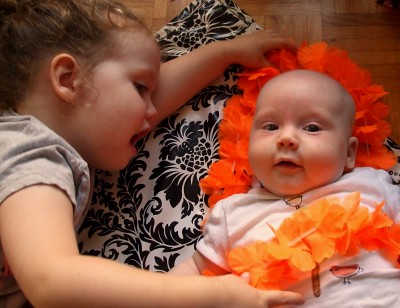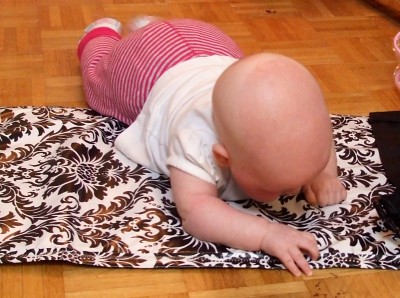Today I have
* a big girl keen to make friends at the library
* a daughter so excited by books we stayed an extra half hour after Storytime to read more books
* a growing baby who sat by herself for two minutes before flopping to the side
* a Big Sister who delights in her baby
* a Little Sister who rolled over by herself for the first time
And I have
* friends who share my passions
* a strong vote of confidence from our minister, whom I respect and admire
A good day.
Thursday, September 22, 2011
Wednesday, September 21, 2011
the things we do, part II
You likely haven't noticed from the pictures I've posted, but Bubby has a pink face. Or more accurately, circles of pink around her eyes. And all over her scalp. And she's had some hives on there, too. It's not something a parent likes to see on her baby. After a little deliberation - including several days of thinking we were cursed with a sunlight allergy - I concluded it was likely a food sensitivity. So for the past 6 weeks I've been gradually eliminating foods from my diet. First wheat, then dairy, then eggs and now soy and, thankfully, we're now seeing a real improvement: it would seem soy is a major offender. Ever tried to eliminate all soy from your diet while living in North America? Yep, it's an eye-opener.
So I'm eating differently now. Some dishes are right out - like, say, a delicious tofu stir fry in a tamari-based sauce and virtually every prepared food out there - while others just need a little adapting. This evening, as I watched Peanut happily munching away on some oven-baked chicken fingers I realized that I really wanted some, too. But bread crumbs, wheat flour, butter, milk and egg wash are all out, so cleverness was called for.
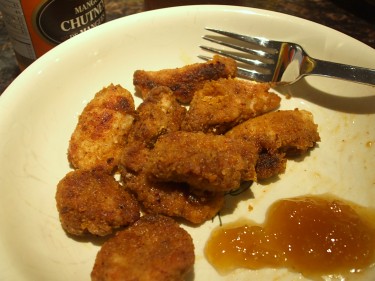
Some crushed gluten-free cereal - corn flakes and puffed rice - a little buckwheat and arrowroot flours and some various seasonings and we were in business. But how to make it stick without eggs or milk? Honey-water! 2tbsp of warm water and at least 1tbsp of honey well mixed together, toss the chicken pieces in the solution and then into the crumb mixture. Bake on an oiled pan at 375*F, turning once.
They were delicious. Even if they hadn't been, though, this is what we do, isn't it? As I told my mother a few weeks ago, I don't care if my own health ends up suffering: I'll gladly sacrifice my own health on the altar of my child's well-being. So far my dietary restrictions haven't had a deleterious effect on my health, just occasionally on my mood and hopefully, with enough inventiveness, that won't be the case too often either.
Tuesday, September 20, 2011
the things we do
What do you do when you need to carry your baby six blocks? You wrap her up.
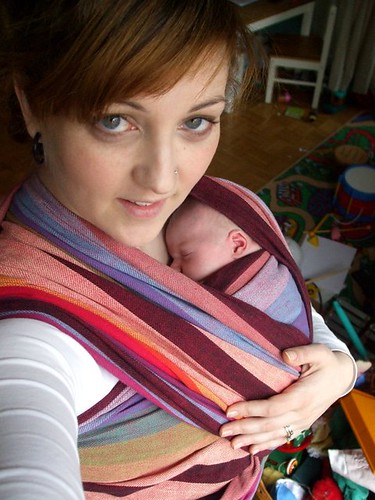
And what do you when your toddler pulls up lame a block into the walk? Well, you wrap her up, too.
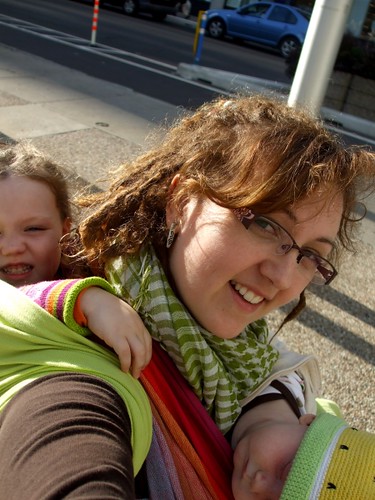
This was the best photo I could get of our little five block tandem-wearing adventure. Sadly, it doesn't do justice to the insanity of the situation. A 5'2" woman wearing more than one third her body weight, with three year old feet dangling around her knees and a four month old head bobbing around near her chin, carting a shoulder bag full of cloth diapers and a tote bag with a plastic potty is a truly ridiculous sight.
The things we do for our kids, eh?

And what do you when your toddler pulls up lame a block into the walk? Well, you wrap her up, too.

This was the best photo I could get of our little five block tandem-wearing adventure. Sadly, it doesn't do justice to the insanity of the situation. A 5'2" woman wearing more than one third her body weight, with three year old feet dangling around her knees and a four month old head bobbing around near her chin, carting a shoulder bag full of cloth diapers and a tote bag with a plastic potty is a truly ridiculous sight.
The things we do for our kids, eh?
Tuesday, September 13, 2011
the urban family
We live downtown. I mean, right downtown. And we love it. Part of what we love about it is our proximity to all the little happenings in the city. Evenings notwithstanding, our city streets are lively and active and there are things to see and do on almost any given day or week.
This past weekend the Glebe held a little street event. So we decided to head down for a little urban family fun.
The best part of the event in the Glebe was not the activities planned for small children but a skateboarding competition. Peanut, you see, adores skateboarding. She sees it pretty routinely in a local park and thinks it is just awesome. So we checked it out.
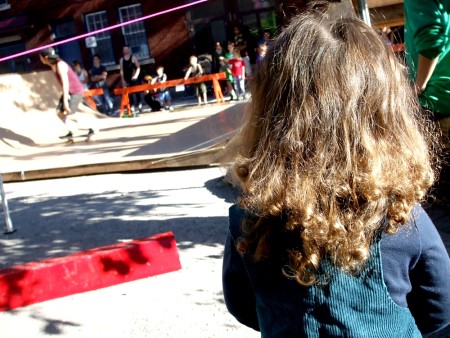
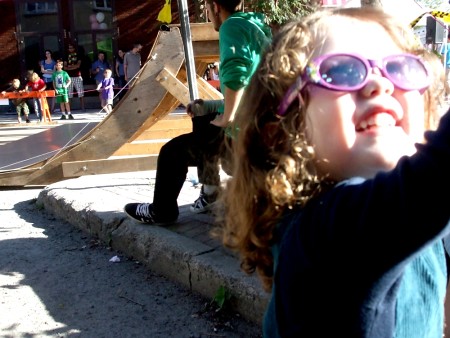
She loved it. Also, there were balloons.
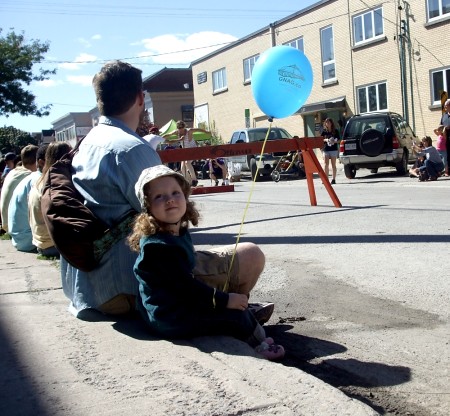
Bubby was less interested in the skateboarding and focussed more on licking the wrap I was wearing her in and just generally being adorable.
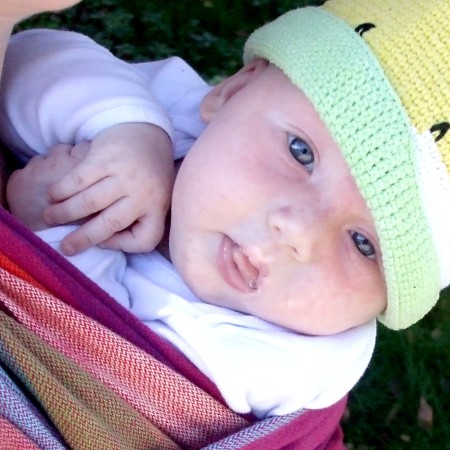
Good times.
This past weekend the Glebe held a little street event. So we decided to head down for a little urban family fun.
The best part of the event in the Glebe was not the activities planned for small children but a skateboarding competition. Peanut, you see, adores skateboarding. She sees it pretty routinely in a local park and thinks it is just awesome. So we checked it out.


She loved it. Also, there were balloons.

Bubby was less interested in the skateboarding and focussed more on licking the wrap I was wearing her in and just generally being adorable.

Good times.
Sunday, September 11, 2011
a common era
**I left this as a comment today on our church blog where members of the congregation reflect on that Sunday's worship service.**
At the end of August, a friend posted on Facebook asking for people's reflections on how the world has changed in the past ten years. As I thought about it over the next days, and after reading another link that he posted, I was struck by the contrasts that we've seen since then: moments of hatred and violence thrown into sharp relief by expressions of love and grace. Those instances of love and grace, those moments of universality and commonality are how I choose to define these days. That view doesn't exclude the hatred and violence nor ignore it, but I refuse to believe that these Years of Our Lord will be defined by evil.
During the minister's sermon he noted that academic institutions are moving toward less Eurocentric names for the two primary eras of history, using the term "Common Era" instead of Anno Domini. What occurred to me as he spoke about this was that using this new term for our current age does not deny or ignore the Good News.
This is a common era, one in which all belong to the universal brotherhood of a world of salvation. These are the days in which salvation is at hand for every person should they so choose and accept it. As Paul writes, there is now neither Jew nor Gentile, neither slave nor free, neither male nor female. We are made one in Christ, the Christ who breaks all barriers, even the barriers we ourselves have built which separate us from God.
And now here we are in a post-9/11 world and while some choose to see only division, we have seen people come together. We have seen the love and grace of Jesus Christ extended from Muslim to Christian and back again.
This is a common era, and I thank God for it.
At the end of August, a friend posted on Facebook asking for people's reflections on how the world has changed in the past ten years. As I thought about it over the next days, and after reading another link that he posted, I was struck by the contrasts that we've seen since then: moments of hatred and violence thrown into sharp relief by expressions of love and grace. Those instances of love and grace, those moments of universality and commonality are how I choose to define these days. That view doesn't exclude the hatred and violence nor ignore it, but I refuse to believe that these Years of Our Lord will be defined by evil.
During the minister's sermon he noted that academic institutions are moving toward less Eurocentric names for the two primary eras of history, using the term "Common Era" instead of Anno Domini. What occurred to me as he spoke about this was that using this new term for our current age does not deny or ignore the Good News.
This is a common era, one in which all belong to the universal brotherhood of a world of salvation. These are the days in which salvation is at hand for every person should they so choose and accept it. As Paul writes, there is now neither Jew nor Gentile, neither slave nor free, neither male nor female. We are made one in Christ, the Christ who breaks all barriers, even the barriers we ourselves have built which separate us from God.
And now here we are in a post-9/11 world and while some choose to see only division, we have seen people come together. We have seen the love and grace of Jesus Christ extended from Muslim to Christian and back again.
This is a common era, and I thank God for it.
Saturday, September 03, 2011
expectation

I always thought that the use of the term "expecting" for pregnancy was odd. What are we "expecting"? Expecting a child to be born? Well, obviously. Expecting there to be a child? But the child is already in there: he or she just needs to come out. And just as the child is there, the woman carrying that child is already a mother, already loves like a mother, already worries like a mother, and the father does likewise. Shouldn't these "expecting" parents instead simply be "waiting"?
But there's another side to the word "expecting". It isn't a guarantee. Nothing is certain: nothing.
Midwifery clients in Ontario are generally given copies of the contents of their files after their post-partum care concludes. The top sheet of paper is the primary sheet of the chart with things like the mother's health history and dates relevant to the pregnancy. At the bottom of the sheet is a list of topics to be discussed at the monthly appointments. As the pregnancy progresses, one by one that list of topics is completed and checked off. When I was expecting Bubby, my midwife and I were talking during one of our appointments. I was struggling with hypertension and she was worried that I would be terribly upset if my health demanded that we abandon our planned home birth for a hospital birth. She wanted to talk about my expectations. As we talked, I told her,
"To be quite honest with you, I don't even entirely expect to get a baby at the end of this. I'm keenly aware that sometimes you just...don't."
And in that room, while Peanut coloured at a little table under a big, happy green leaf, with glorious sunshine beaming in the window, bathing the room, we talked about stillbirth. We talked about neonatal death. We talked about mothers we've known, both in person and online, who have lost babies not early in a pregnancy but late, so late that it is unfathomable, so late that a happy outcome seemed a sure thing. We talked about mothers who have held their baby after a normal birth, awash in the glow of everything going right, who days or even just hours later held that baby as that tiny life slipped from this world.
And we wept. We wept for those mothers and fathers who had something so very precious so fleetingly. We wept as we smiled while talking about the immeasurable value of a photograph of a father holding his child, precious and perfect and entirely still in his arms. The eternal gift of a moment, of just one moment, and the image of that moment frozen, cherished forever.
There is no line-item for stillbirth and death on that page in my chart. It isn't one of the mandatory topics of discussion. But we must talk about this. We cannot live blindly, ignoring the very truth and reality that mortality is universal: it does not only belong to the old. It walks hand-in-hand with birth. The great fragility of life is part of what throws life's beauty into such relief to be celebrated.We do a great disservice to families when we speak as though everything were certain. We needn't dwell on such terrible pain, but likewise we must acknowledge its possibility.
It's a pain I do not know and have not the gall to suppose that I can imagine. While I was expecting Peanut I felt great surety when I reached 32 weeks. "Now I am safe," I thought. "Now I can be certain that everything will be fine." But with Bubby I was not so naive. Better do I now know that nothing is certain. Nothing is safe. As I laboured with Peanut I was never concerned for her safety, so sure was I that everything would always be fine. But as I laboured with Bubby, aware that my own body was failing, I had occasion to wonder after her health. Was she safe? Was she well? What would happen? Birth is as safe as life gets...and life can be painfully uncertain.
I am struck today by the absolute appropriateness of the term "expecting". When one is pregnant one expects to have a child to hold and kiss and love and nurse and raise into being a strong and beautiful person. But we do not know. We make the best choices that we can, we best our odds for success and health and happiness...and the rest we give up to God.
Because we cannot know for certain. We have only the expectation of joy.
Subscribe to:
Comments (Atom)

